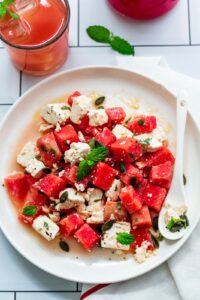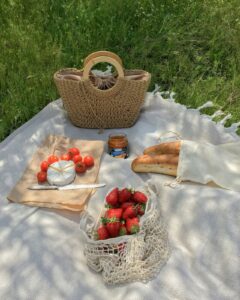
Dr. Roshan Ramlal, PhD MPH, FACS Agent, UGA Extension Forsyth County
Here are some tips on how to make your summer picnic nourishing and safe!
Around this time of year, many are shopping and planning for weekend outdoor barbeques and picnics at a local park, near the lake, at a neighborhood swimming pool, or at the beach. Enjoying the evening ambience of Cumming City Center’s musical amphitheater, fishing or sailing on Lake Lanier with family and friends, or grilling while children play nearby at one of Forsyth County parks are memorable ways to celebrate the 4th of July holiday weekend.
With Georgia’s scorching temperatures, a little preparation goes a long way when preventing foodborne illnesses. Stay healthy and protect your loved ones by following these tips.
- Keep cold food cold.
- Wash your coolers with soap and water, rinse it thoroughly, and dry it before using (Ansel & Ellis, 2020).
- Use insulated coolers filled with ice or frozen gel packs. Frozen food can also be used to keep things cool.
- A full cooler maintains its cold temperature longer than a partially filled one.
- Keep coolers in the shade.
- Organize cooler contents.
- Raw meat, poultry and seafood should be kept in separate coolers from plant-based foods and dairy products to prevent cross-contamination.
- Consider packing perishable and beverages in separate coolers and labeling the coolers with stickers. Drinks can be in one cooler that can be opened and closed multiple times.
- Salads (tuna, chicken, egg, pasta, and seafood) can be in a different labeled cooler.
- Packaged deli meats/cheeses, yogurt, and other dairy products can be kept at the bottom of a cooler with assembled sandwiches and cut up fruits and vegetables at the top for easy accessibility at the picnic table.

- Safe food handling.
- Pack plenty of clean dishes, tongs, and serving spoons if you don’t have the means to wash items at the picnic site, particularly larger serving dishes, bowls, and utensils.
- Pack disposable dishes, bowls, cups, forks, spoons, knives, and toothpicks (for easy access to cut fruits and veggies).
- Take a jug of water, hand soap, and paper towels if picnic site does not have easy access to a bathroom. Wash hands with warm water and soap for 20 seconds before and after handling food and after using the bathroom, changing diapers, and handling pets. Wet wipes are also convenient to keep on hand in case jug of water finishes.
- Clean your produce. Rinse fresh fruits and vegetables under running tap water before packing in cooler, even if they have skins and rinds. Dry fruits and vegetables with a clean cloth towel or paper towels. If you are short on time (or too lazy to wash!), buy packaged fruits and vegetables that say “ready-to-eat,” “washed,” or “triple washed” need not be washed.
- Grill Safely
- Keep marinated foods in the fridge- always. Not out on the counter.
- Do not reuse marinade sauce on cooked food.
- Use one cutting board for raw meats, poultry and seafood only.
- If you are planning a picnic away from home, do not partially cook at home beforehand. Partial cooking before grilling is meant to speed things up for when grilling at home when you can move from cooking inside directly to a hot grill outside.
- Remember your food thermometer:
| Food Type | Minimum Internal Temperature |
| Beef, Pork, Lamb, & Veal | 145∘F (with a 3-minute rest time) |
| Ground Meats | 160∘F |
| Whole Poultry, Poultry Breasts, & Ground Poultry | 165∘F |
- Serving Food Outdoors
- Set your iphone timer and examine your weather app. Don’t let food set out in the Danger Zone – 40 °F and 140 °F – for more than two hours. In extreme Georgia heat (above 90°F), food should never be left out for more than one hour. These temperatures are ideal for bacteria to grow and make people sick.
- Salads, dips, and desserts can be kept cold by serving in aluminum trays packed with ice. Or, place the product in a deeper dish with ice.
- Hot foods should be kept hot at or above 140°F.
- If food sits out too long, throw it out. It’s better to be safe than a trip to the hospital for e.coli, salmonella, or other common foodborne diseases. Some may have that an iron clad stomach, but why take the risk? No unneeded drama to ruin 4th of July fireworks.
- If reheating fully cooked hot dogs and hamburgers, grill them to 165°F (74°C) or until steaming hot.
